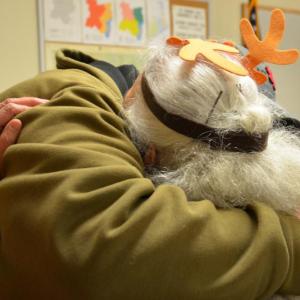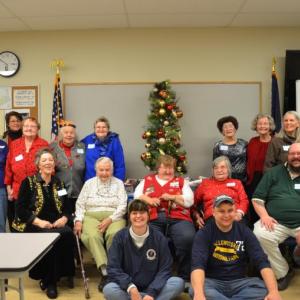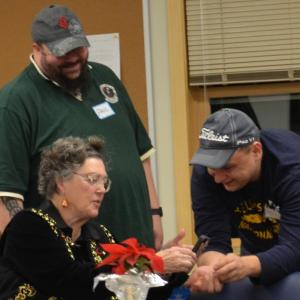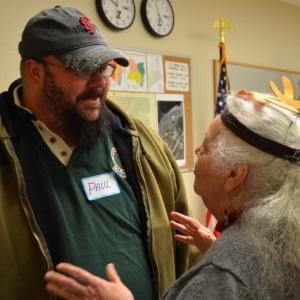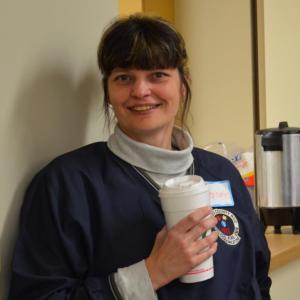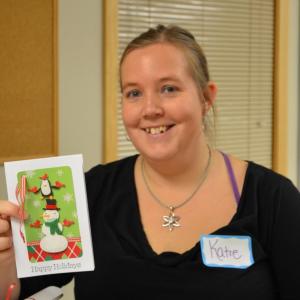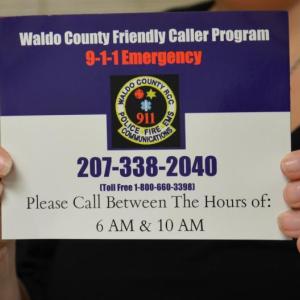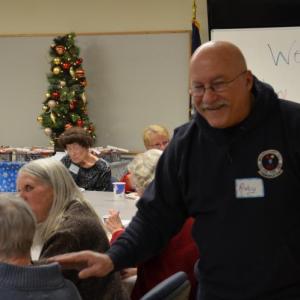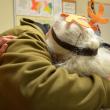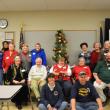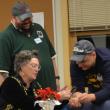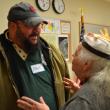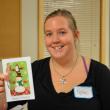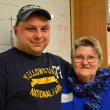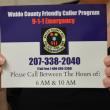Waldo County dispatchers lend peace of mind
 A kind word every day and a big hug goes a long way in Waldo County, Maine. (Photo by Lynda Clancy)
A kind word every day and a big hug goes a long way in Waldo County, Maine. (Photo by Lynda Clancy)
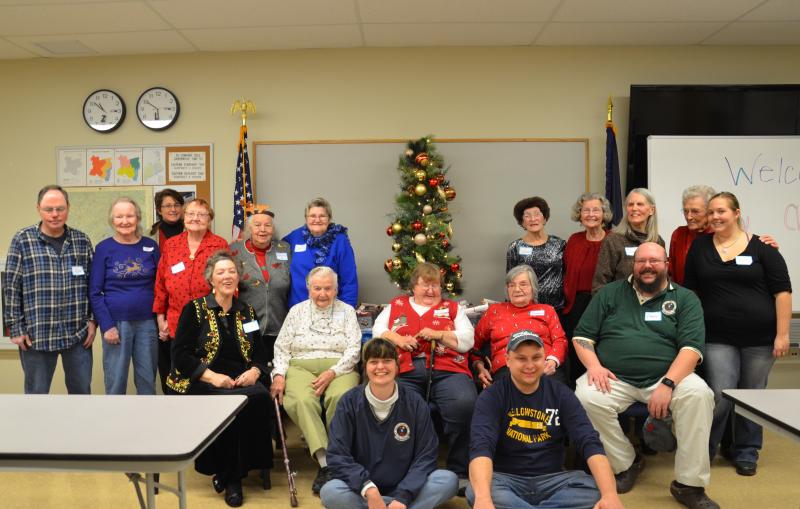 Waldo County dispatchers and almost all of their Friendly Callers. Dispatchers include Katie Dakin, Mike Larrivee, Misty Lewis, Stephanie Lunt, Matt Varney, Andy Cardinale and Director Owen Smith. Participants include Shirley Bessey, Irmagard, Alonzo, Dorothy Gordon, Betty, Fenalyn, Margaret, Lorraine, Ida Jean, Joyce Thompson, Actnea Gaudette, Barbara Kue and Dorothy Mellsren. (Photo by Lynda Clancy)
Waldo County dispatchers and almost all of their Friendly Callers. Dispatchers include Katie Dakin, Mike Larrivee, Misty Lewis, Stephanie Lunt, Matt Varney, Andy Cardinale and Director Owen Smith. Participants include Shirley Bessey, Irmagard, Alonzo, Dorothy Gordon, Betty, Fenalyn, Margaret, Lorraine, Ida Jean, Joyce Thompson, Actnea Gaudette, Barbara Kue and Dorothy Mellsren. (Photo by Lynda Clancy)
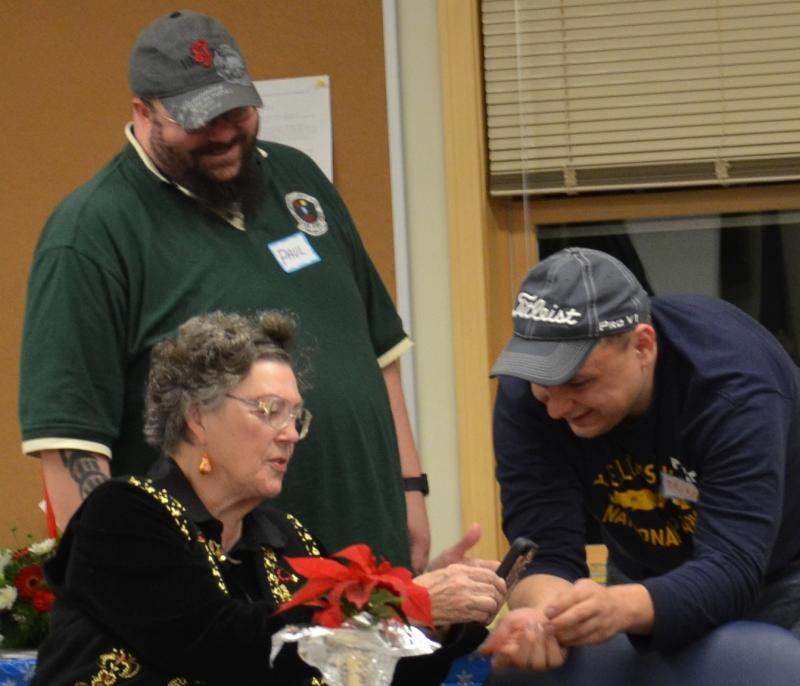 Mike shows Betty and Paul photos from his trip to Yellowstone. (Photo by Lynda Clancy)
Mike shows Betty and Paul photos from his trip to Yellowstone. (Photo by Lynda Clancy)
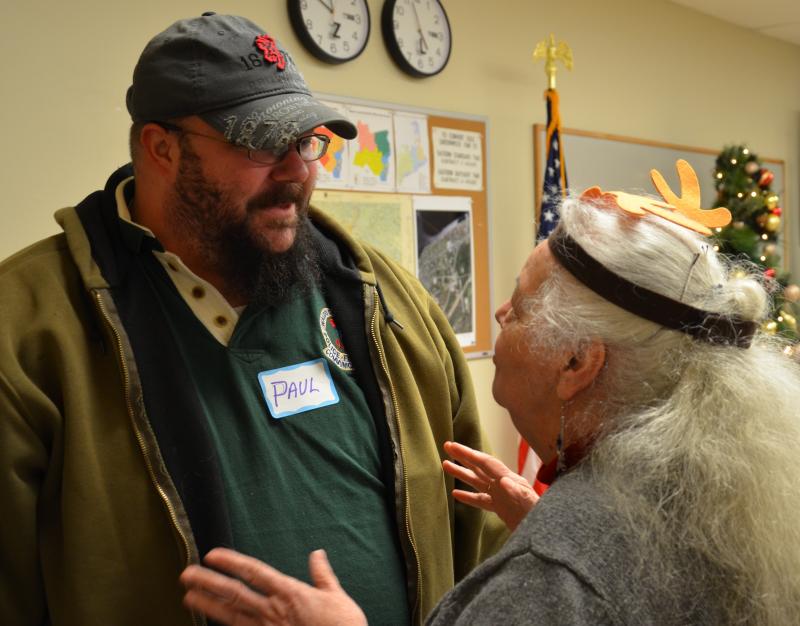 Paul and Dottie talk a lot on the phone, but they never see each other in person. (Photo by Lynda Clancy)
Paul and Dottie talk a lot on the phone, but they never see each other in person. (Photo by Lynda Clancy)
 (Photo by Lynda Clancy)
(Photo by Lynda Clancy)
 Stephanie Lunt works at Waldo County Regional Communications Center as a dispatcher. (Photo by Lynda Clancy)
Stephanie Lunt works at Waldo County Regional Communications Center as a dispatcher. (Photo by Lynda Clancy)
 Katie Dakin, a dispatcher with Waldo County Communications, made Christmas cards for each of the callers this year. All the callers received cards and gifts made specially for them. (Photo by Lynda Clancy)
Katie Dakin, a dispatcher with Waldo County Communications, made Christmas cards for each of the callers this year. All the callers received cards and gifts made specially for them. (Photo by Lynda Clancy)
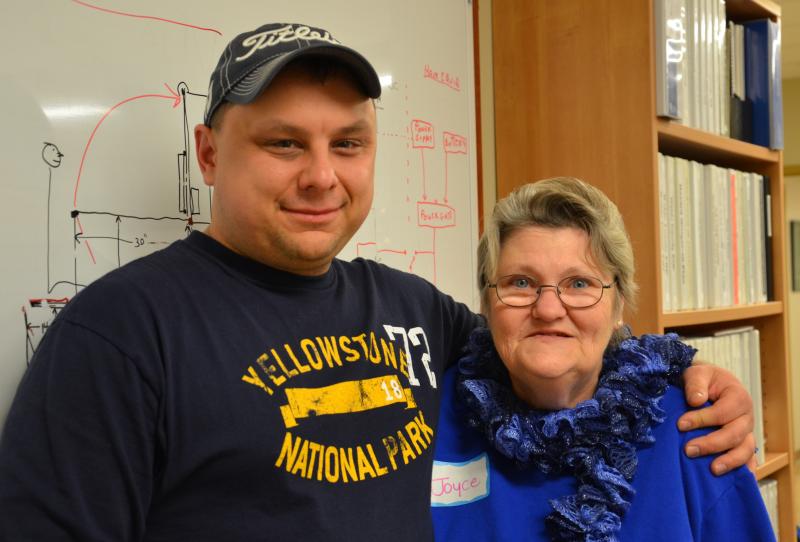 Mike Larrivee and Joyce Thompson. (Photo by Lynda Clancy)
Mike Larrivee and Joyce Thompson. (Photo by Lynda Clancy)
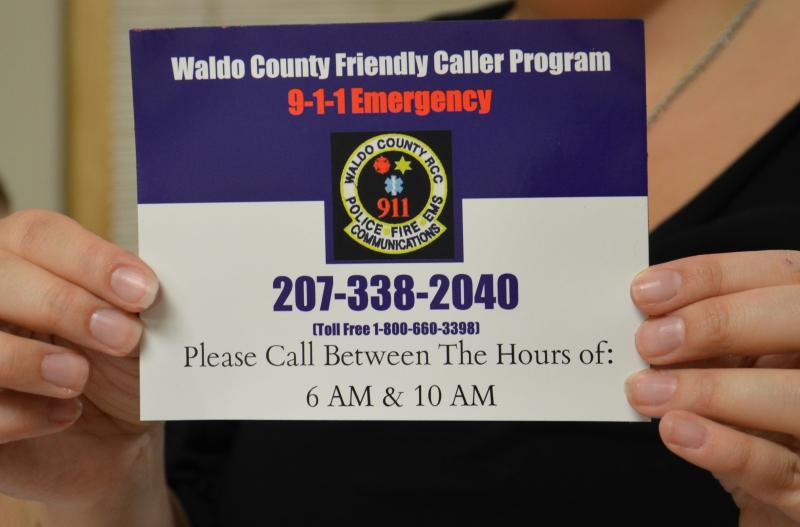
 Dispatcher Andy Cardinale was at the dinner until an ambulance call pulled him away. (Photo by Lynda Clancy)
Dispatcher Andy Cardinale was at the dinner until an ambulance call pulled him away. (Photo by Lynda Clancy)
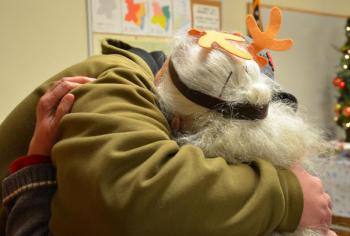 A kind word every day and a big hug goes a long way in Waldo County, Maine. (Photo by Lynda Clancy)
A kind word every day and a big hug goes a long way in Waldo County, Maine. (Photo by Lynda Clancy)
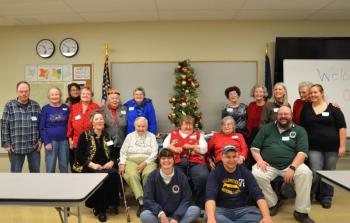 Waldo County dispatchers and almost all of their Friendly Callers. Dispatchers include Katie Dakin, Mike Larrivee, Misty Lewis, Stephanie Lunt, Matt Varney, Andy Cardinale and Director Owen Smith. Participants include Shirley Bessey, Irmagard, Alonzo, Dorothy Gordon, Betty, Fenalyn, Margaret, Lorraine, Ida Jean, Joyce Thompson, Actnea Gaudette, Barbara Kue and Dorothy Mellsren. (Photo by Lynda Clancy)
Waldo County dispatchers and almost all of their Friendly Callers. Dispatchers include Katie Dakin, Mike Larrivee, Misty Lewis, Stephanie Lunt, Matt Varney, Andy Cardinale and Director Owen Smith. Participants include Shirley Bessey, Irmagard, Alonzo, Dorothy Gordon, Betty, Fenalyn, Margaret, Lorraine, Ida Jean, Joyce Thompson, Actnea Gaudette, Barbara Kue and Dorothy Mellsren. (Photo by Lynda Clancy)
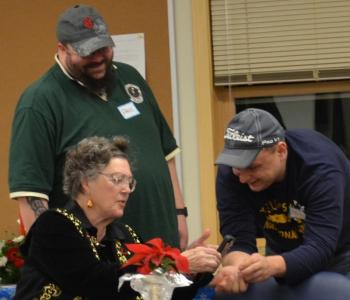 Mike shows Betty and Paul photos from his trip to Yellowstone. (Photo by Lynda Clancy)
Mike shows Betty and Paul photos from his trip to Yellowstone. (Photo by Lynda Clancy)
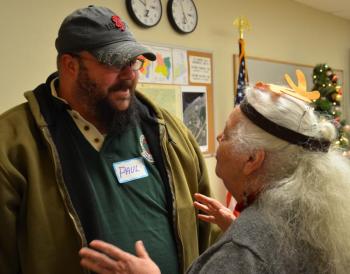 Paul and Dottie talk a lot on the phone, but they never see each other in person. (Photo by Lynda Clancy)
Paul and Dottie talk a lot on the phone, but they never see each other in person. (Photo by Lynda Clancy)
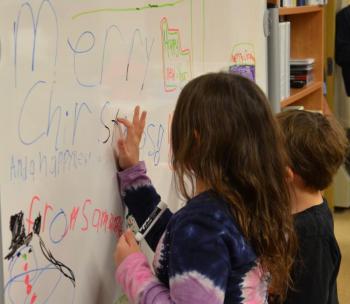 (Photo by Lynda Clancy)
(Photo by Lynda Clancy)
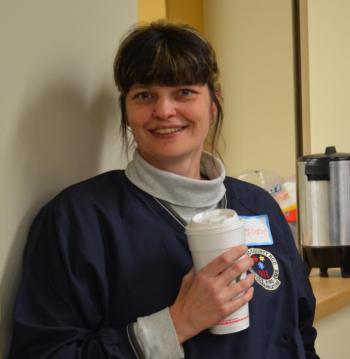 Stephanie Lunt works at Waldo County Regional Communications Center as a dispatcher. (Photo by Lynda Clancy)
Stephanie Lunt works at Waldo County Regional Communications Center as a dispatcher. (Photo by Lynda Clancy)
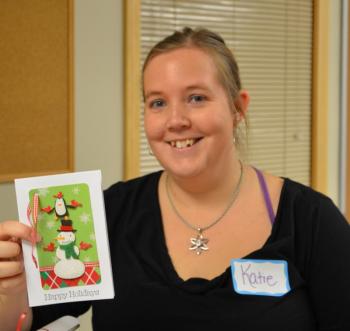 Katie Dakin, a dispatcher with Waldo County Communications, made Christmas cards for each of the callers this year. All the callers received cards and gifts made specially for them. (Photo by Lynda Clancy)
Katie Dakin, a dispatcher with Waldo County Communications, made Christmas cards for each of the callers this year. All the callers received cards and gifts made specially for them. (Photo by Lynda Clancy)
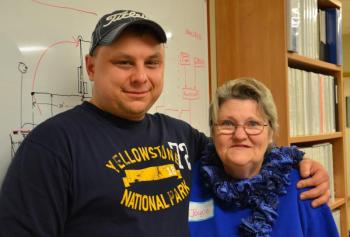 Mike Larrivee and Joyce Thompson. (Photo by Lynda Clancy)
Mike Larrivee and Joyce Thompson. (Photo by Lynda Clancy)
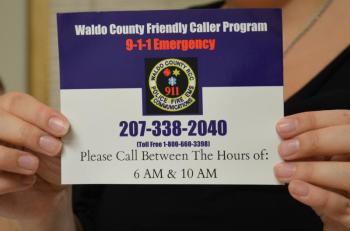
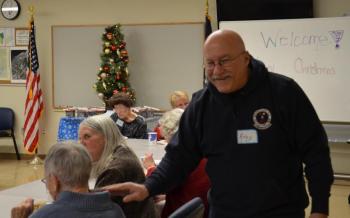 Dispatcher Andy Cardinale was at the dinner until an ambulance call pulled him away. (Photo by Lynda Clancy)
Dispatcher Andy Cardinale was at the dinner until an ambulance call pulled him away. (Photo by Lynda Clancy)
BELFAST — Shirley Bessey got a call in the middle of the night: “You got cows out in the road.” Granted, it was 2:30 a.m. and the road by Thor-Knox Farms on the Knox Ridge is quiet at that time of night; still, being the only human on the 400-acre farm, and of a not-so-young age, Bessey called her neighbor, Clayton Larabee, just to let him know she was heading outside.
“I’m sorry to wake you up, but I didn’t want to be out in the road alone,” she told him, not asking Larabee to join her, only to be aware of her whereabouts. Then the 88 year-old got in her car and found the cows.
“Half a dozen of them had gotten playing by the fence and this little guy got pushed out,” she said. “He got looking at momma on the other side and didn’t know how to get back. I went upside him and kind of tooted my horn, and he went back under the fence.”
“You still have cows,” I asked her.
“A few,” she said. “Like 38.”
Then she grinned and said if I got her dessert, she’d let me come out and see her farm.
Bessey was at Waldo County Regional Communications Center in Belfast Friday evening, Dec. 13, for the annual Friendly Callers holiday dinner, hosted by the dispatchers. She sat at the table with 14 other Friendly Caller participants, finishing up a plate of ham and potatoes while we talked about the value of phone calls, especially when one lives alone. Having daily conversations on a regular basis is something most adults take for granted. But when one is elderly, or infirm, the boundaries of the world often shrink to the home walls, and it becomes even more reassuring to hear a calm and warm voice on the other end of the phone line.
For Bessey, and 15 others who currently participate in the Friendly Callers program, it is simply peace of mind.
Every morning, between 6 and 10 a.m., they call into the Waldo County Communications Center in Belfast, which is next door to the Waldo County Sheriff’s Office and Jail. WCRCC — or county dispatch, for short — handles all 911 calls made throughout Waldo County. The 16 dispatchers working in staggered shifts are trained in emergency communications, all vital to keeping a highly-functioning first responder system intact. But they also have time to tend to the more marginalized members of the community, the elderly who live alone.
Friendly Callers is simple program, whereby the participants make a call to dispatch on a daily basis, and dispatch knows that everything is OK in each of the caller households. If not, dispatchers call in the troops, aka, Waldo County Sheriff deputies, to investigate.
With the Friendly Caller program, dispatchers take the morning calls, sometimes chatting for just a few minutes, sometimes for 20, depending on the volume of emergencies.
The program contract is built on a handshake: Participants apply, filling out paperwork that identifies their addresses, relatives and emergency contacts. And, they commit to the protocol of calling dispatch every day. If they fail to call by 10 a.m., a dispatcher will call them. If there is no answer, the dispatcher will call a relative, and if that results in no contact, a deputy will be sent to the residence.
That has happened a few times; in one situation, the deputy discovered a woman lying on the kitchen floor, in need of immediate transport to the hospital.
“We made a difference,” said WCRCC Director Owen Smith. “She acknowledged that without the program, she might have died.”
The program originated approximately eight years ago in Waldo County, courtesy of Waldo CAP and Senior Spectrum, two nonprofits seeking to better assist shut-ins and the elderly in a county of 38,000-plus residents, of whom 51 percent is over 65 years of age. Three years ago, WCRCC absorbed the Friendly Callers, and set up the program inhouse.
“It is no cost to the county,” said Smith, who, along with several dispatchers, hosted the annual Christmas dinner for the participants. The callers had arrived at the community meeting at 4 p.m. from all over the county — Jackson, Brooks, Prospect, Knox, Lincolnville and Belfast. Relatives and friends escorted some; others who couldn’t get a ride, dispatchers went out in their own cars to bring them in.
“Everything is paid for by contributions dispatchers make on dress-down Friday or Saturday,” said Smith. “They will put money in the box.”
That little bit adds up over the year, and by the holidays, it is time to spend it on the Friendly Callers. Until the past few years, the dispatchers would put together care baskets for each of the callers and take them to their houses. But now, they are having more fun holding an annual get-together dinner that provides a chance for everyone to meet face-to-face.
This year, dispatcher Katie Dakin’s husband, Jason, was the chef, cooking ham, potatoes, stuffing, beans, carrots and corn. Katie Dakin welcomed the callers to the dinner and then sent them to the buffet table to fill their plates. The dispatchers came and went, floating around the tables, visiting with the callers and giving hugs.
It used to be that the dispatchers would hold an annual holiday party, the kind of generic office party that happens everywhere as the season gets into full swing. But not anymore. They prefer to host the Friendly Caller dinner.
”This is so much better than doing our Christmas party,” said Dakin. Two other dispatchers standing by — Stephanie Lunt and Mike Larrivee — nodded in agreement, before walking off to get coffee for the Friendly Callers.
“We could probably handle 35 to 40 callers a day,” said Smith. “Between 6 and 10 a.m. is our slow time, unless it’s a storm or something else. If they don’t call us by 10, we’ll call them. We are the support line for people who don’t see someone every day.”
Occasionally, he said, dispatchers will also learn through their daily conversations about con artists trying to take advantage of the elderly.
“Sometimes they’ll reveal things, like somebody tried to scam them,” he said.
Besides the dinner, the dispatchers assembled presents for each of the callers, baskets that contained, among other items, gift cards for the Brooks thrift store, Hannaford and Anglers Restaurant.
“The Friendly Caller program is not a strain on the system,” said Smith. “98 percent of the days we can handle up to 40 callers. We just won’t chitchat if we are busy.”
Criteria for participating in the program specifies that one must be 65 or older, and does not see anyone on a regular schedule every day.
“And they have to remember to call us,” stressed Smith. “If they don’t want to call us it won’t work. Everyone here wants to be in the program.”
To participant Betty Vanidestine, of Jackson, the program’s value lies in the peace of mind.
“It’s wonderful for anyone living alone,” she said. “It is insurance that someone is checking on me.”
She sets her alarm for 6 a.m. and makes sure to call as soon as she is up. She is a busy woman, and she has been with the Friendly Caller program for three years.
“When I first heard about it, I signed up,” she said.
Joyce Thompson, another participant, makes sure she calls before she has breakfast. It is just part of her daily routine, now.
For Shirley Bessey, she will call when she is ready. Sometimes it’s early in the morning, sometimes it is getting on toward 10 a.m.
“The biggest thing is the feeling of comfort, of reassurance” she said. “I’m the last one of the family, and have no connections, family-wise. I have a bunch of Herefords that have to be kept track of. Along with this, I am just plain lucky to have people.”
To learn more about the Friendly Callers program, call 338-2040 or 800-660-3398.
Reach Editorial Director Lynda Clancy at lyndaclancy@penbaypilot.com; 207-706-6657
Event Date
Address
United States

